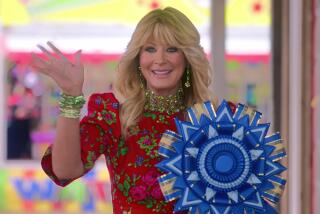What if reality TV players faced the big gong?
- Share via
AT the turn of the century, when the reality TV craze was young and scary (think Fox’s scandalized shotgun-wedding conceit “Who Wants to Marry a Multi-Millionaire?” or people caged in a house together on CBS’ “Big Brother”), we speculated that this newfangled voyeurism was leading us toward televised death.
Reality TV, after all, would only get more depraved -- stakes raised, judgments clouded, further intimacies invaded. How, then, to explain why the most popular reality show on TV today is about underdogs-in-bloom, “American Idol” -- an innocent singing contest? (OK, an innocent singing contest with avaricious corporate tie-ins.)
Even the more craven stuff -- remember Fox’s “The Swan,” which delivered ugly ducklings to Los Angeles plastic surgeons? -- attests to the genre’s most enduring appeal: Fame in a bottle, outsized attention that yields, most chillingly, to individual and collective identity. Nobody wants to see people die on TV; they want, over and over, to see how TV -- in the micro and macro sense -- can make them known.
Chuck Barris oughta know: In 1976, he gave birth to “The Gong Show,” whose spirit was ahead of its time, with people making spectacles of themselves via queer talents or no talent at all and boozy, woozy comedian-entertainers serving as executioners, hitting a gong to stop the madness.
What Barris guessed too -- from “The Dating Game” and “The Newlywed Game” -- is that people are malleable as populist entertainment, and that the home viewer would get off on their public triumphs but even more so on their shame.
Which is why the conceit behind Barris’ new novel, “The Big Question,” feels like a dated reality show parable, although the story begins in 2011, after the president has declared euthanasia legal and CNN has televised a Texas execution.
On “The Big Question,” six people vie for $100 million in the ultimate Draconian contest: Answer the final question wrong and you die (by drinking poison for all the world to see).
Barris had a large hand in stirring the reality TV pot but then, it turned out, he wasn’t around to revel in its actual boiling point. He became a Museum of Radio and Television footnote (e.g., his “Gong Show” featured a young David Letterman as a judge) then re-emerged in 2002 with the re-release of his kooky 1982 memoir, “Confessions of a Dangerous Mind,” which revealed that he not only produced popular TV shows but, he claimed, also took side trips out of the country as a covert assassin for the CIA.
Reading “The Big Question” made me miss Barris and the vaudeville atmosphere he represented -- even if he’s more fabulist than stylist, and his fictionalized cautionary tale ignores what’s actually been evolving in reality TV.
In the novel, Barris creates a narrative doppelganger called “the cripple,” a sad, down-and-out shell of an ex-game show producer who has the same credits as the real Barris, not to mention a similar gait. (I have a strong image, as a youth in Beverly Hills, of seeing Barris loping around the village, alone.)
“You see,” the cripple says early on, “I was ahead of my time. I was always ahead of my time which, as far as I’m concerned, is as bad as being behind the times. Neither works.”
Nor can the cripple take any solace that some of the coolest kids in Hollywood (George Clooney, Julia Roberts, screenwriter Charlie Kaufman) made a pretty good movie of “Confessions,” which sank at the box office.
“It was probably the biggest disappointment of his life,” Barris writes. “The cripple remembered that disaster as if it were yesterday.”
Disaster? He’s reduced, in the novel’s present, to accosting a producer on the street, a producer who mistakes the cripple for a derelict (neither man is named, perhaps so they seem nearly biblical). The cripple intends to pitch a pilot he once did that never got off the ground, called “The Death Game.”
From there the novel sprawls to give us the back stories of the various characters who will, eventually, become the six contestants on the renamed “The Big Question.” Some of them are out of central casting, and none are as memorable as, say, “The Gong Show’s” Gene Gene the Dancing Machine (or Barris himself, for that matter, hat pulled drooping over his eyes).
They include a lonely widow in Steubenville, Ohio, a hayseed just off the bus from Kentucky, a handsome young Catholic priest, a petty thief-turned-jailhouse-imam and his bright, young prostitute wife.
Better is the neglected Beverly Hills rich girl who rebels and then reforms, becoming a brain surgeon. Barris might be in dystopian Martin Amis territory, but he spins the story more like the comedians kibitzing at Carnegie Deli in “Broadway Danny Rose.” The Kentucky newbie goes to work for a fight promoter, overseeing the training of a philandering Swedish heavyweight contender in the Catskills. He runs afoul of mobsters, including Giuseppe “The Chop” Sanseli. “Legend had it Sanseli used a meat cleaver on several unfortunate business associates’ fingers when they crossed him on his way to the top of the Staten Island Mafia family he controlled,” Barris writes.
It’s possible to enjoy “The Big Question” as dark satire, but the novel is at its thinnest around its outsized theme: Execution as TV blood sport.
If you’re going to conjure the day when the death penalty is a game-show booby prize, you need to give us that day. But the macabre show glides to air without much sense of how it’s playing out culturally (or what else is going on in the world, for that matter). The moment of truth feels shoehorned in.
Ultimately, “The Big Question” reminds us that Barris can venture into his imagination to juggle plates, even if the juggling here betrays a hoary argument about reality TV. “You know the old game show axiom: the biggest audience for the least amount of money,” the cripple tells the producer, referring to CNN’s televised execution, adding, “Let me tell you, someone’s going to think of my idea sooner or later.”
It’s possible, of course, that Fox is only a few years away from putting a “Big Question” in development. But if the hue and cry that forced the cancellation of O.J. Simpson’s book “If I Did It” and his Fox TV special recently wasn’t exactly a proud societal corrective, it was nevertheless a corrective. Right, Mr. Barris?
More to Read
Sign up for our Book Club newsletter
Get the latest news, events and more from the Los Angeles Times Book Club, and help us get L.A. reading and talking.
You may occasionally receive promotional content from the Los Angeles Times.







